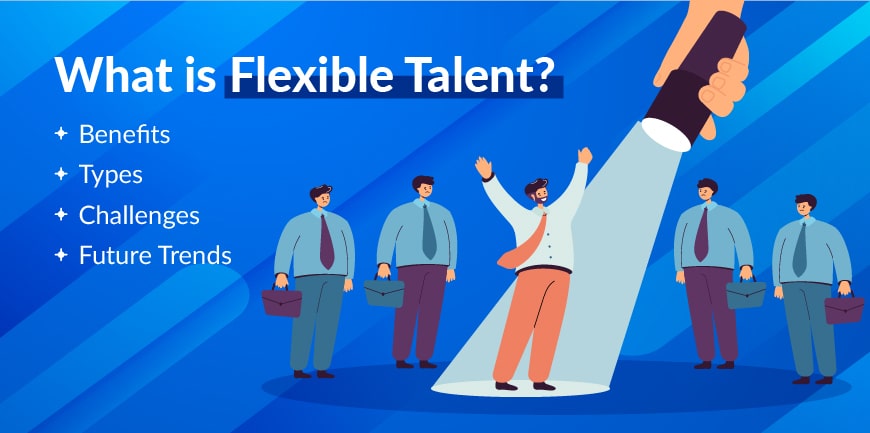
What is Regulatory Compliance?
28/04/2025
Impact of Social Media and Advocacy in Enhancing Employer Reputation
30/04/2025- Introduction
- What is Flexible Talent?
- What are the Types of Flexible Talent?
- What are the Benefits of Flexible Talent?
- When to Use Flexible Talent?
- What are the Challenges of Managing Flexible Talent?
- What are the Strategies to Effectively Manage Flexible Talent?
- What is the Future of Flexible Talent?
- Frequently Asked Questions (FAQs)
The market is unpredictable, and businesses must either adapt or loose. Harnessing the potential of flexible talent, a dynamic workforce in today’s world, can help businesses be agile and maintain a competitive edge. Flexible workforce solutions allow businesses to tap into contractors, freelancers, and other on-demand experts to help organizations effectively scale their workforce without loss in productivity.
Introduction
Flexible talent management is a new-age solution where an agile workforce is a necessity. From startups, mid-sized companies to large corporations, organizations have realized that flexible talent strategies can reduce costs, boost operational agility in ways traditional staffing practices cannot. In the HR world talent acquisition experts must keep up with the evolving workplace trends and adopt flexible talent management is a strategy they must embrace to attract and retain the best.
What is Flexible Talent?
Flexible talent refers to a workforce that includes a blend of full-time employees, part-time employees, freelancers, contractors, and other contingent workers. It is typically a workforce that is not just a traditional full-time employment.
Flexible talent management approach facilitates short-term projects or major market evolution. It helps deliver skills on demand, enabling rapid responses, supporting innovation, and streamlining operations while keeping costs low.
According to the 2024 Workforce Innovators Playbook, successful companies that have included flexible talent as part of their talent strategy, achieve better financial results than their peers. 85% consider freelancers critical to reaching their organizational goals, compared to 65% of their peers.
What are the Types of Flexible Talent?
Flexible talent can be hired from various recruitment options, beyond the traditional full-time model available to them. Each of these models serve a unique purpose as per the workforce needs of a business.
1. Fractional hiring
Top level professionals from C-suite to specialists are hired on a part-time basis or a project or retainer basis. It is a type of flexible hiring arrangement that delivers premium skills and experience at a much smaller cost as compared to a full-time hire.
2. Project based talent
If you have recently acquired specific projects, hiring individuals who can deliver value to your project makes sense. Additionally, engaging them for a fixed term based on a contract until the project is completed will result in better deliverables.
3. Part-time professionals
Certain countries have individuals who are skilled and qualified but are seeking part-time opportunities. These individuals are a type of flexible talent who are looking for an opportunity to rise in their career as well as maintain a healthy family life.
4. Remote workers
Hiring remote flexible talent reduces expenses on infrastructure for businesses, while allowing them to hire form a broader talent pool. Businesses can hire for geographical regions that offer skilled talent at a lower cost without the need for long-term commitment.
5. Seasonal Workers
Seasonal workers are hired at specific times of the year. For example, retail industries engage them during peak sale seasons, like holiday shopping periods. In tourism, it is during the summer holidays or months, a greater number of tax professionals are hired during tax season.
6. Job sharing
Two employees share one full-time role, allowing businesses to retain skilled professionals while keeping salary costs under control. Both employees share responsibility for the outcomes of the role. This can save the company money and ensure continuity, reduce downtime.
7. Virtual Assistants
Similar to remote work, engaging virtual assistants can save an enormous amount of money for companies. For example, by hiring virtual assistants for marketing support, companies not only streamline operations but also avoid the hassle of hiring in-house full-time staff.
What are the Benefits of Flexible Talent?
Hiring flexible talent can help businesses thrive by offering adaptability and cost efficiency. Companies can access a wider talent pool and experience the delivery of quality products, services, and customer experience. Some of key benefits of flexible talent are-
1. Cost-Efficiency
This is a big plus of hiring flexible talent. When people work remotely, there is a lot of savings on new infrastructure costs, maintenance costs, transportation costs and some savings on other benefits like food and beverages too.
2. Improves Retention
When you have a combination of full-time and remote employees, then the employees who are in service will be less impacted by layoffs, if they happen to remote employees. This is because they will still have colleagues with whom they have bonded over time and prefer to work with too. By laying off remote employees in a transition, you can improve retention.
3. Access to a global talent pool
Hiring flexible talent means, moving beyond traditional recruitment and hire from various geographical regions, that allows companies access niche, skilled talent who offer the best demonstrated expertise.
4. Prevents Bad Hires
Hiring flexible talent means being able to hire staff who want to work remotely. Hiring these highly skilled people who wish to work on a contract or on gigs remotely greatly reduces the risk of bad hires.
5. Increased Productivity
Flexible talent can increase productivity. Generally, remote staff are known to perform a lot better than those who work from the office, typically because of a stress-free environment and a great work-life balance. So having a few key employees working remotely while having your full-time in-office staff improves productivity.
6. Helps Upskill Workspace
Flexible talent arrangement allows you to hire highly skilled people. This leads to a learning and development boost at the workplace, where everyone learns from them and implements their new learning to drive innovation. This will in turn also lead to better internal mobility for those who are now upskilled.
When to Use Flexible Talent?
Flexible Talent can be engaged when companies are looking to fill specific skill gaps, address seasonal workloads, and access specialized talent for successful execution of certain projects.
1. Address skill gaps
If your internal team does not have the specific expertise required for a particular project or task, flexible talent can be engaged. `For example, you can hire a freelance web developer with knowledge in specific technology to build an application.
2. Handle Temporary Demand
If you are facing a surge in workloads or spike in customer demands, hiring flexible talent can allow you to scale your workforce up or down without having to commit to full time employment. Retail industries engage flexible talent during holiday seasons or other peak periods.
3. Access specialized talent
Flexible talent can add excellent value and deliver the best results for specialized projects. If you need a consultant with expertise in a specific industry, hiring a contractor can do the needful.
4. Cost Savings
Using flexible talent can reduce overhead costs associated with full-time employees, such as benefits and payroll. It also allows companies to quickly adapt to changing market conditions and project needs, making them more agile and responsive.
Some of the key industries that engage and require flexible talent are- Healthcare, IT, Retail, Construction and Warehousing.
What are the Challenges of Managing Flexible Talent?
Engaging flexible talent does have a ton of benefits but managing flexible talent comes with its own set of challenges too.
- Monitoring productivity and ensuring accountability can get harder especially with remote or hybrid work arrangements
- Managing performance and measuring results can be tricky
- Avoiding bias in performance evaluations regardless of work arrangement must be focussed on.
- Communicating only through digital platforms can lead to miscommunication, impacting teamwork.
- Fostering a sense of belonging and ensuring remote workers feel included while maintaining company culture is important
- Balancing the flexibility of work arrangements with the need to meet project deadlines and business objectives can be a challenge.
- It is important to ensure that the flexible talent you choose to hire has all the necessary technology and tools to effectively work no matter where they are working from.
- Implementation of robust security protocols and ensuring employee know the importance of data privacy is crucial to keep up the productivity.
What are the Strategies to Effectively Manage Flexible Talent?
To ensure your company’s flexible talent exhibit their full potential, your need a talent management strategy that blends innovative tools and smart metrics.
1. Collaborate with a Staffing Agency
You can get the help of a staffing agency to understand the market and gain insights into the recruitment process. This will greatly reduce the time and cost of hire and more importantly increase the quality of hires.
2. Assess your Staffing Needs
Conduct a skills gap analysis. Figure out the answers to the following questions. How many hires do you need? What are the qualifications and experience that is required? This is another vital flexible talent management strategy that you must start with.
3. Broaden the Talent Pool
Find talent for specific skills by hiring workers who want to work remotely. Allow experienced workers to work remotely if they have the necessary skills. Even if you do not hire them immediately, you can always get back to them later.
4. Set Clear Metrics
Define and track deliverables to ensure results, not just activity. Instead of measuring hours worked, focus on the quality and timeliness of the work.
5. Continuously Optimize
Make sure you conduct a performance review once in every three months. Assess if using flexible talent help boost your return on investment. Analyse and adapt strategies when necessary to match your talent needs.
What is the Future of Flexible Talent?
In the near future, hiring flexible talent will not just be a trend. It will be about building a sustainable work model that boosts company productivity, employee well-being and higher cost savings.
- With more and more countries implementing stricter regulations, flexible work arrangements can help businesses remain compliant with labour laws.
- Flexible talent offers business the agility to adapt to changing market conditions whether its shifting client demands or workforce changes.
- Companies that offer flexibility demonstrate a commitment to employee well-being, leading to higher retention rates and a more engaged workforce.
- Hiring flexible talent offers companies a competitive edge by showing candidates that you are concerned about their wellbeing as well as career growth.
- Offering employees the flexibility to work on their terms, whether they want to work remotely or prefer a hybrid environment etc will boost productivity without burnout.
- Remote or hybrid work reduces costs on infrastructure. However, it is more than just cutting costs. You can reinvest savings in other areas that matter.
- Flexibility builds loyalty. According to Flex Jobs EU, over 70% of employees said they would be more likely to stay long-term with a company that offers flexible arrangements.
Flexible talent management is a game changer for businesses aiming to stay ahead in 2025. By leveraging FTM, companies can unlock agility, reduce costs, and ignite growth, all while tapping into a global pool of expertise and onboarding resources within days. Now is the perfect time to adopt this flexible strategy and reshape what success means.
Frequently Asked Questions (FAQs)
1. What is flexible talent?
Flexible talent refers to a workforce that includes a blend of full-time employees, part-time employees, freelancers, contractors, and other contingent workers. It is typically a workforce that is not just a traditional full-time employment.
2. What are the benefits of using flexible talent?
Flexible talent arrangements offer a myriad of benefits including- cost savings, access to talent with specialized skills, higher business agility, learning and development of the current workforce, access to a global talent pool, higher retention, prevents bad hires, scalability of the workforce.
3. What are the challenges of managing flexible talent?
Managing flexible talent presents several challenges, including ensuring fair compensation and benefits, maintaining consistent performance expectations, and fostering effective communication and collaboration across different work arrangements. Additionally, managing remote or hybrid work can increase the risk of isolation and burnout, requiring proactive engagement and support initiatives.
4. What are the legal considerations when hiring flexible talent?
Some of the legal considerations when hiring flexible talent include- understanding that flexible compensation is not about one size fits all, creating a fair and competitive compensation package while maintaining compliance with existing laws, ethical implications of pay equity in flexible compensation, compliance with labour laws and regulations, actively involving employees in discussions about their benefits, organizations can create a more equitable environment, balancing flexibility with organizational accountability.
5. How does flexible talent impact employee engagement?
Flexible talent management enables employees to achieve better work-life balance, increasing their job satisfaction. Flexible schedules also reduce their stress and increase their productivity. Consequently, they become more engaged in their roles, which benefits the company in many ways.
Contact Us For Business Enquiry

Rajkumar Shanmugam
Rajkumar Shanmugam is the Head of HR at ALP Consulting, bringing over 19 years of comprehensive HR leadership experience across India and international markets. His expertise spans talent acquisition, employee relations, performance management, compliance, and HR transformation. Rajkumar has a proven track record of driving people-centric initiatives, enhancing workplace culture, and aligning HR strategy with business goals. With extensive experience in US staffing operations and global mobility, he continues to lead organizational excellence through innovation and employee engagement.




